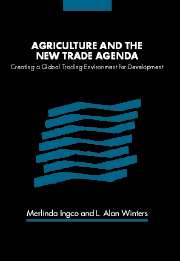Book contents
- Frontmatter
- Contents
- List of figures, tables, and boxes
- List of contributors
- Preface
- List of abbreviations
- 1 Introduction
- 2 Agriculture and the trade negotiations: a synopsis
- Part I Experience and lessons from the implementation of WTO agreements
- Part II Interests, options, and objectives in a new trade round
- 6 Agriculture, developing countries, and the Doha Development Agenda
- 7 Where the interests of developing countries converge and diverge
- Part III New trade rules and quantitative assessments of future liberalization options
- Part IV New trade issues and developing country agriculture
- Author index
- Subject index
- References
7 - Where the interests of developing countries converge and diverge
Published online by Cambridge University Press: 27 February 2010
- Frontmatter
- Contents
- List of figures, tables, and boxes
- List of contributors
- Preface
- List of abbreviations
- 1 Introduction
- 2 Agriculture and the trade negotiations: a synopsis
- Part I Experience and lessons from the implementation of WTO agreements
- Part II Interests, options, and objectives in a new trade round
- 6 Agriculture, developing countries, and the Doha Development Agenda
- 7 Where the interests of developing countries converge and diverge
- Part III New trade rules and quantitative assessments of future liberalization options
- Part IV New trade issues and developing country agriculture
- Author index
- Subject index
- References
Summary
Introduction
The environment surrounding trade negotiations has changed since the end of the Uruguay Round. Some of these changes are significant. At least fifty-four new developing countries have joined the WTO since January 1995. In fact, some two-thirds of the WTO Members are now developing nations. Given this substantial representation, the interests of this group will probably have more influence in shaping the agenda of forthcoming negotiations on further liberalizing agricultural trade.
Discussion of these interests often seems premised on the notion that developing countries are a homogeneous group. Such countries do have common interests in liberalizing overall trade, and in creating and maintaining a system that does not discriminate against subsets of countries. These interests also include better-functioning international agricultural markets and access to foreign markets, greater stability of world prices, a better system for resolving trade disputes, clearer guidelines for implementing food safety (also known as sanitary and phytosanitary SPS) measures, and clearer “contingency” provisions such as anti-dumping rules, to reduce the risk that these will be used as thinly disguised protectionism.
Developing countries also have an interest in evaluating the impact of freer trade on world economic growth as well as on growth in individual countries. Accordingly, this chapter also addresses the degree to which developing countries have divergent interests, from a number of perspectives: income level, size, region, net trade position regarding food and other agricultural products, and openness of the agricultural sector.
- Type
- Chapter
- Information
- Agriculture and the New Trade AgendaCreating a Global Trading Environment for Development, pp. 136 - 148Publisher: Cambridge University PressPrint publication year: 2004
References
- 3
- Cited by



